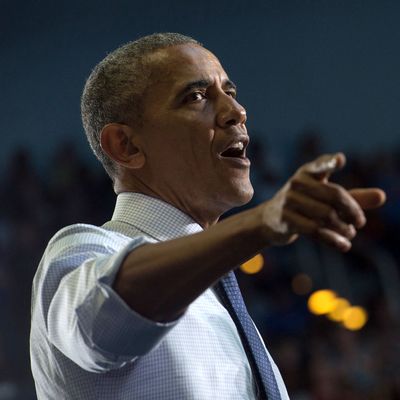
And now, some thoughts about power, from someone who would know a thing or two about it. “Let me tell you something about this office that I’ve been in for eight years,” President Barack Obama said this week in a speech at Miami’s Florida International University. “Who you are — what you are — does not change after you occupy the Oval Office. All it does is magnify who you are. All it does is shine a spotlight on who you really are.”
It must be hard to figure out who he is talking about, since you’re reading that quote out of context. Here are some more clues:
If you disrespected women before you were in office, you will disrespect women as president. If you accept the support of Klan sympathizers before you are president, you will accept their support after you are president. If you disrespect the Constitution before you are president and threaten to shut down the press when it says something you don’t like, or threaten to throw your opponent in jail in a live presidential debate without any regard for due process — if you discriminate against people of different faiths before you are president, then that is what you will do in office, except you will have more power to carry out the twisted notions that you had before you were in office.
Recently on Quartz, Michael K. Kraus — an assistant professor in Yale University’s School of Management — highlighted research in psychology (including several experiments he helped conduct) that echo Obama’s sentiment here, that power has way of revealing a person’s nature. “The more power people get, the more freedom they feel they have to be their authentic selves, acting consistently with their goals and values,” Kraus wrote. The old “power corrupts” adage isn’t exactly supported by the empirical evidence; instead, Kraus and others have found, power “simply brings our true nature out into the open.”
In a series of experiments, for instance, Kraus his colleagues found that when you simply remind people of a time they wielded power over others, those people became more “consistent in their traits across social groups.” Put another way: “The freedom that comes with power allowed individuals to be the same person across contexts.” Indeed, other studies have suggested that people who were feeling powerful also felt like they were being more authentic — “more like their true self” — as compared to those who were not feeling powerful.
Kraus’s piece is worth reading in full; Vox’s Brian Resnick also recently trod similar territory. All told, studies like these and others suggest, Kraus writes, “that having power allows people to freely express themselves in situations where others might more carefully consider how their behavior impacts, or even harms, others.” Interesting information! Do with it what you will.

